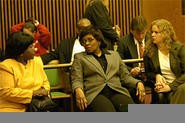
Jacquie Maiden, a poised preacher's wife, huddles between her attorneys. Next to her is Kathy Dreamer, a subdued Irish woman seemingly unaccustomed to her charcoal suit. Hiding in the corner is Rosie Grier, a soft-spoken lady who's spent most of her life changing bedpans for seniors.
They look more like a sewing circle than a gang of convicts. But the three Cuyahoga County Board of Elections employees face seven charges each, accused of rigging the 2004 presidential election recount.
In moments, Corrigan will christen Maiden and Dreamer felons. A jury has found them guilty of negligent misconduct and failure to perform their duties.
Given the election board's legacy of incompetence, the verdict will come off to some as a victory for democracy. Yet a closer examination reveals just another triumph for county government as usual.
As Cuyahoga County dealt with record turnout in the 2004 election, liberals fretted over voter suppression and missing ballots. John Kerry may have won the county by an astounding 227,000 votes, but the election board had built a sturdy reputation for chaos and ineptitude. Suspicions were natural.
So the Green and Libertarian parties demanded a recount. To board employees, it was no big deal; they'd already conducted four that year.
But Director Michael Vu knew that with the light shining on Ohio, a doubtful public would be studying his every move. He went to Assistant County Prosecutor Reno Oradini, the board's lawyer, for legal advice.
"We said just stay consistent with what you've done in the past, in case of any lawsuits," Oradini said.
That's where the problems began.
Oradini apparently never bothered to research the matter; otherwise he'd have known his advice was illegal. For more than two decades, the board had mistakenly been violating the law with its recount procedures. Now Maiden, the elections coordinator, and Dreamer, the ballot manager, had been ordered to do it again.
Since 1981, the rules had been simple: Randomly select 3 percent of the precincts for a preliminary recount. If those numbers don't add up, the board would recount all 650,000 ballots.
The two women selected a cross section of suburbs and slums from precincts of 550 voters or more, believing this met the "random" requirement. They also presorted the ballots into neat piles according to winning candidates, so that witnesses could move through the count quickly and smoothly. "It was common practice," testified former ballot manager Claudette Barth. "The staff presorted the ballots so when the witnesses sat down, they'd be ready to go."
But it was also very illegal. Law dictates that the sealed ballots can be opened only before witnesses on the official day of the recount.
On December 16, 2004, more than 100 journalists, advocates, and residents showed up to watch. Of the 37 precincts, nothing was amiss. There would be no countywide recount.
But it all seemed too smooth for those convinced of a conspiracy. "Our suspicion was that [the ballots] had been pre-counted," testified George Taylor, a Democratic witness.
The Green Party accused the board of violating election laws, charging that precincts hadn't been randomly selected and that ballot containers had obviously been opened. The Greens were right, of course.
But though Oradini, Vu, and the board's chairman, state Republican chief Bob Bennett, were giving the orders, special prosecutor Kevin Baxter went after the low-hanging fruit.
Four months later, Maiden, Dreamer, and Grier were sitting in the county jail.
When the trial began this month, Baxter accused the women of rigging the recount behind their bosses' backs "to avoid a laborious recount." The presorting of ballots, he charged, was actually an elaborate plan to avoid a countywide recount.
It was a curious argument, seemingly supported by no evidence. Bennett has maintained that everyone thought the board's practices were kosher. "We requested advice from two different public prosecutors," he told Scene when the charges were first brought. "We were told to not change the way we've done it since 1981."
Other employees said presorting was common. "We always hand-sorted," said Jim Santora.
But the women's superiors were doing their best to deflect blame. Though it was his job to study the board's practices before rendering advice, Oradini was now invoking lazy lawyering as his defense. If he'd actually known about the board's methods, he testified, he would have warned employees.
"That's not how lawyers act," said Maiden's lawyer, Bob Rotatori. "They don't just say, 'Keep doing what you're doing' without the facts."
So the jury was posed with a perplexing dilemma: Crimes clearly had been committed, but with no sign of malice. The election board had been winging it for two decades, without regard for the law. And when it came time for legal advice, Oradini tanked the job. It was, in short, just another day in county government.
Last week, Maiden and Dreamer were cleared of intentionally rigging the recount, but found guilty of not upholding the law.
Even jurors seemed loath to castigate the women. "I don't think they knew what they were doing was wrong," says juror Craig Snook. "They were given instructions by people to do this a certain way, but it was still negligent and illegal for them to do it."
For following orders, Maiden and Dreamer are now felons. They may even face prison time, as long as 18 months.
As attorneys prepare appeals, Rotatori is left to marvel at the mystery of justice. "In my opinion, it's all an attempt to make sure that [Prosecutor Bill] Mason's office did not get any egg on its face. They OK'd everything. And here are these three lifelong civil servants who get indicted. Not the director, assistant director, or board members. None of the people who have all the decision-making authority, but these women who were just following orders. They are scapegoats. That's exactly what they are."













